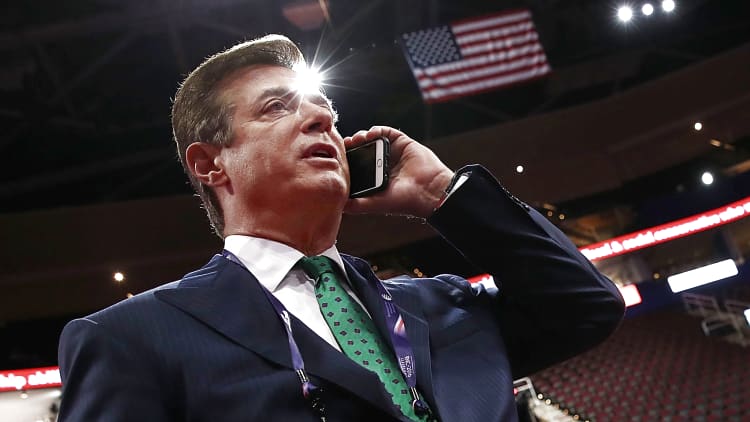
The Department of Justice on Monday unveiled indictments of former Trump campaign chairman Paul Manafort and his former longtime business partner Rick Gates, alleging the pair hid overseas payments and conspired to launder money.
The special counsel's team, led by Robert Mueller, laid out the charges in a 31-page indictment:
The indictment contains 12 counts: conspiracy against the United States, conspiracy to launder money, unregistered agent of a foreign principal, false and misleading FARA statements, false statements, and seven counts of failure to file reports of foreign bank and financial accounts.
Terms such as "conspiracy against the United States" and "unregistered agent of a foreign principal" sound ominous, but, according to a 30-year veteran of corporate litigation, it is important that people shouldn't read too much into the wording.
"All federal charges are written to sound serious," Ira Matetsky, lawyer and partner at Manhattan-based firm Ganfer & Shore, told CNBC.
Matetsky stressed the importance of understanding the charges' context. However, he believes the charges in this case are very serious, as they include felony accusations.
The indictments mark a new phase in Mueller's investigation into Russian attempts to interfere in the 2016 presidential election. But, while Manafort was once President Donald Trump's campaign chairman, Matetsky sees the connection to the White House ending there, at least for now.
"This is activity that happened to come up while investigating someone who was on Mueller's radar," Matetsky said.
Peter Henning, a law professor at Wayne State University who has written about white collar crime for The New York Times, agrees with Matetsky.
"Anything related to the election is tangential" at this point, Henning told CNBC, as the accusations revealed Monday are "a couple steps removed at best."
"Everyone thinks 'Manafort, Trump,' but I don't see anything at all related to Trump," he said.
The case centers around the Foreign Agents Registration Act, Henning said. According to him, Mueller is looking at the work Manafort and Gates did on behalf the Ukrainian government, both for former President Viktor Yanukovych and others.
"Money laundering is the sexy count, but it's not at the heart of this," Henning said.
Mueller is seeking multiple ways to find information for his investigation, both lawyers said. Shortly after unveiling the charges Monday, Mueller revealed a plea deal made with George Papadopoulos, another former advisor to Trump's campaign. Papadopoulos pleaded guilty on Oct. 5 to lying to FBI agents about when he met with Russian nationals to get "dirt" on Hillary Clinton.
"A takeaway from Papadopoulos being targeted, in addition to Manafort and Gates, might be that this seems to be a wide-ranging investigation rather than a narrowly focused one," Matetsky said.
Henning said the details in the indictment of Manafort and Gates also points to Mueller casting a wide net.
The special counsel's office has "thrown a lot out there that's not directly relevant to the charges that they're bringing," Henning said. "They're liars, is what the special counsel is trying to say here."
Beyond involvement in Ukraine, Henning said Mueller will try to pin both men on tax evasion.
"They are going to try to keep Manafort and Gates from saying 'this was just a few times,'" Henning said.
The conspiracy charge is the bow that ties all the more specific charges together, Matetsky said. He defined conspiracy as "when any two people enter into an agreement to break federal law," clarifying that a variety of different crimes may fall under conspiracy, from the money laundering alleged here to tax evasion or even treason.
WATCH: Paul Manafort's lawyer says charges 'ridiculous'



